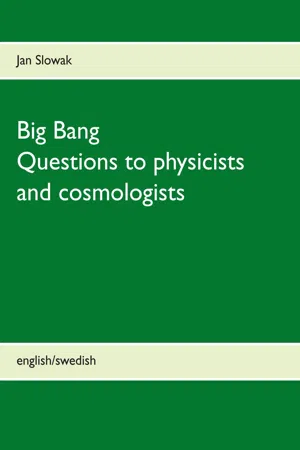
eBook - ePub
Big Bang - Questions to physicists and cosmologists
Jan Slowak
This is a test
- 48 pages
- English
- ePUB (mobile friendly)
- Available on iOS & Android
eBook - ePub
Big Bang - Questions to physicists and cosmologists
Jan Slowak
Book details
Book preview
Table of contents
Citations
About This Book
The author believes that parts of Big Bang theory is not scientifically based and therefore try to stimulate debate by taking up some concepts and ask questions to physicists and cosmologists.Författaren anser att delar av Big Bang teori har icke vetenskaplig grund och därför försöker väcka debatt genom att ta upp några begrepp och ställa frågor till fysiker och kosmologer.
Frequently asked questions
How do I cancel my subscription?
Can/how do I download books?
At the moment all of our mobile-responsive ePub books are available to download via the app. Most of our PDFs are also available to download and we're working on making the final remaining ones downloadable now. Learn more here.
What is the difference between the pricing plans?
Both plans give you full access to the library and all of Perlego’s features. The only differences are the price and subscription period: With the annual plan you’ll save around 30% compared to 12 months on the monthly plan.
What is Perlego?
We are an online textbook subscription service, where you can get access to an entire online library for less than the price of a single book per month. With over 1 million books across 1000+ topics, we’ve got you covered! Learn more here.
Do you support text-to-speech?
Look out for the read-aloud symbol on your next book to see if you can listen to it. The read-aloud tool reads text aloud for you, highlighting the text as it is being read. You can pause it, speed it up and slow it down. Learn more here.
Is Big Bang - Questions to physicists and cosmologists an online PDF/ePUB?
Yes, you can access Big Bang - Questions to physicists and cosmologists by Jan Slowak in PDF and/or ePUB format, as well as other popular books in Biological Sciences & Science General. We have over one million books available in our catalogue for you to explore.
Information
That is how much literature anywhere that treats the Big Bang theory. But I will stick to the allegation above and I write as little as possible and as simple as possible.
The beginning of everything
There is nothing more amazing, nothing more fascinating than the human ability to think!
And there is nothing more fascinating than our universe with all its stars and galaxies.
How is it then with the Big Bang? Big Bang is the cosmological standard model, that explains how the universe arose, how it develops and what will become of it in the future.
From the first contact with the Big Bang theory, I was its opponent, I could not accept it.
Everything we had read in school, in physics and chemistry lessons, was based on the
following motto:
ex nihilo nihil fit!
following motto:
ex nihilo nihil fit!
What are saying proponents of the Big Bang theory?
That everything was created in a huge explosion: everything, space, time, matter and energy.
In one of the many books that deal with this topic stands:
There was an explosion of space (and time and matter and energy) is happening everywhere in the universe. How then "everywhere in the universe"? The universe had not existed yet when it was created!
It is very confusing! This is more like creation stories, creation myths.
This is not science!
This contradicts the fundamental physical laws. In this case, the first law of thermodynamics. Energy can neither be created nor destroyed, it can only change form. In a process in an isolated system the total energy always remains the same.
Question 1: Can something come out of nothing?
After a few years
The cosmological standard model says that the universe expands at a speed of about 71km / s / Mpc (Mpc = Megaparsecs, unit of length). This value is denoted by H0, is called the Hubble constant, and has been amended several times over the course of time, depends on various measurements. If you count backwards you come to a time of about 13.7 billion years ago the Big Bang.
Much has happened since then. First of all, something happened that we call inflation. In the fraction of a second, space expanded by a factor of 1028.
Then there was calmer in about 380,000 years. But it was dark! There was no light! And there was no one who could have said "Let there be light!". But there was something! There was matter. And energy! There were electrons, nuclei and other particles. After the above time interval, the temperatu...
Table of contents
- Dedication
- Table of Contents
- 1) English/Engelsk version
- 2) Swedish/Svensk version
- Copyright
Citation styles for Big Bang - Questions to physicists and cosmologists
APA 6 Citation
Slowak, J. (2016). Big Bang - Questions to physicists and cosmologists (1st ed.). Books on Demand. Retrieved from https://www.perlego.com/book/1759290/big-bang-questions-to-physicists-and-cosmologists-pdf (Original work published 2016)
Chicago Citation
Slowak, Jan. (2016) 2016. Big Bang - Questions to Physicists and Cosmologists. 1st ed. Books on Demand. https://www.perlego.com/book/1759290/big-bang-questions-to-physicists-and-cosmologists-pdf.
Harvard Citation
Slowak, J. (2016) Big Bang - Questions to physicists and cosmologists. 1st edn. Books on Demand. Available at: https://www.perlego.com/book/1759290/big-bang-questions-to-physicists-and-cosmologists-pdf (Accessed: 15 October 2022).
MLA 7 Citation
Slowak, Jan. Big Bang - Questions to Physicists and Cosmologists. 1st ed. Books on Demand, 2016. Web. 15 Oct. 2022.